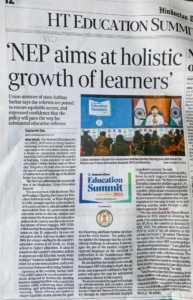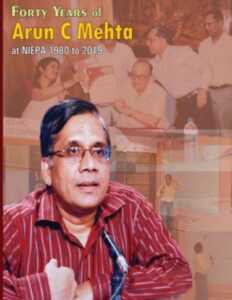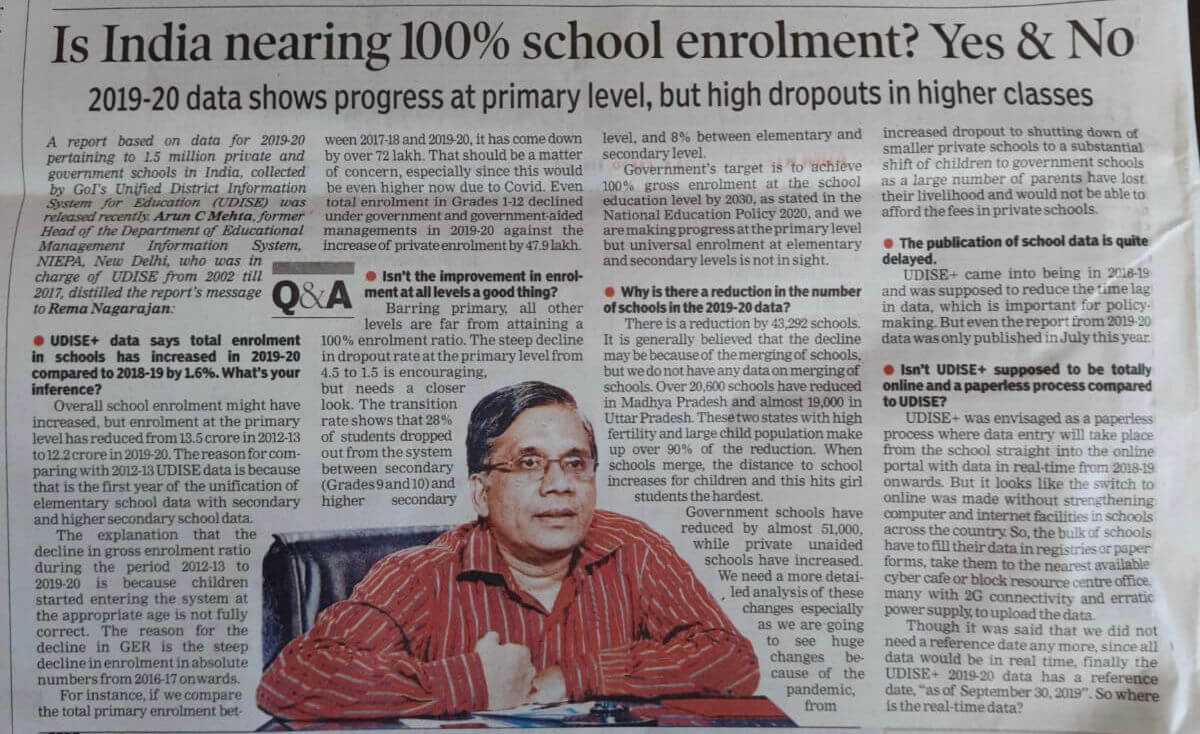National Education Policy (NEP 2020)
Computing Uncomputed Indicators in Responce to NEPA 2020
National Education Policy (NEP)
It has been a practice to have Commissions and Committees established on education even by the British well before the independence details of which is presented below. The earliest Charles Wood Despatch was commissioned in 1854 and the last, The Sargent Plan was commissioned just before the independence in the year 1944.
| Name of Committees/ Commissions | Year |
| Charles Wood Despatch | 1854 |
| Hunter Commission | 1882 |
| Raleigh Commission | 1902 |
| Sadler Commission | 1917 |
| Hartog Commission | 1929 |
| Sargent Plan | 1944 |
Since the independence in 1947, the Government of India sponsored a variety of programmes concerning education in both the rural and urban areas and commissioned a number of commissions and committees over a period of time details of which is presented below:
- University Education Commission (1948–1949)
- Secondary Education Commission (1952–1953)
- University Grants Commission and
- Kothari Commission (1964–66)
Based on the recommendations of these Commissions, a number of new establishments, such as Indian Institutes of Education (IITs), National Council of Educational Research and Training (NCERT) and host of other institutions were established. Based on the Kothari Commission, the then Prime Minister of India, announced the first National Policy on Education in the year 1968 which had emphasis on restructuring. Fulfilling the compulsory education for all children up to the age of 14 as specified in the Constitution of India, three language formula in secondary education, expenditure on education to increase to six percent of the GDP were the other far reaching recommendations of Kothari Commission. Details of the subsequent policy formation is presented below:
| Prime Minister | Policy | Year |
| Indira Gandhi | First | 1968 |
| Rajiv Gandhi | Second | 1986 |
| Narendra Modi | Third | 2020 |
In addition to Commissions and Committees, a number of centrally sponsored schemes were also launched by the federal governments from time to time which are listed below:
- Restructuring and Reorganization of Teacher Education (1987).
- Operation Blackboard (1987–98) aimed to improve teachers and physical resources in primary schools.
- Minimum Levels of Learning (1991) specifying achievement at various stages and revision of textbooks
- District Primary Education Programme (DPEP) (1993) with emphasis on decentralized planning and management and school effectiveness.
- National Programme for Nutritional Support to Primary Education (1995): Noon Meal Scheme with a provision to provide a cooked meal every day for all children in Classes 1–5 of all government, government-aided and local body schools.
- The movement to Educate for All (2000) aimed to achieve universal primary education by 2010 through micro-planning and school-mapping exercises, bridging gender and social gaps through Sarva Shiksha Abhiyan (SSA) Programme.
- Fundamental Right (2001) involved the provision of free and compulsory education, declared to be a basic right for children aged between 6 and 14 years which subsequently enactment of Right to Education in 2009.
- National Policy on Education 2020 (66 Pages), Ministry of Education
- National Policy on Education 2020 (55 Pages), Ministry of Education
- Highlights of National Education Policy 2020
- New Education Structure based on NPE 2020
- Holistic Approach to School Education-Highlights of National Education Policy (NPE 2020)
- NEP 2020: Creating SEDGs & SEZs, National Workshop
- Education Commission_& Committees by EVANGELINE Sheela_Bell_
- Education Commissions & Committes since Independence (Taleemi Board)
- National Policy on Education 2016: T.S. R Subramanian Committee for the Evolution of New Education Policy (English)
- National Policy on Education 2016: T.S. R Subramanian Committee for the Evolution of New Education Policy (Hindi)
- National Policy on Education (1986 and 1992)
- Programme of Action (1992)
- Education and National Development : Report of The Education Commission, 1964-66 (Vol. 1)
- Education and National Development : Report of The Education Commission, 1964-66 (Vol. 2)
- 1949 Report of the University Education Commission
- 1953 Secondary_Education Commission_ReportEVANGELINE
- 1990 Acharya Ramamurti Report
- 1992 NPE 1986 as Modified in 1992
- 1996 Delors Commission Report
- 2015 Eurydice Assuring Quality in Education
- 2015 Understanding and Facilitating the Development of Intellect
- Parliamentary Standing Committee Report on Compulsory Elementary Education
- Constitution Ninety-Third Amendment) Bill, 2001
- Right to Education
- Guidelines of Kasturba Gandhi Bal Vidhalaya Scheme
- NPEGL
- Reconstituted CABE Committee
- National Evaluation of Kasturba Gandhi Bal Vidhalaya Scheme (KBGV)
- Mid-day Meal: Noon-Meal Scheme
- Education And National Development : Report of The Education Commission, 1964-66 (Vol. 1)
- Education And National Development : Report of The Education Commission, 1964-66 (Vol. 2)
- Elementary Education in 12th Plan: 2012 to 2017, MHRD
- 1949 Report of the University Education Commission
- 1953 Secondary_Education Commission_Report
- 1990 Acharya Ramamurti Report
- 1992 NPE 1986 as Modified in 1992
- 1996 Delors Commission Report
- Yashpal Committee Report to Advise Renovation & Rejuvenation of Higher Education in India
- 2015 Eurydice Assuring Quality in Education
- 2015 Understanding and Facilitating the Development of Intellect
- 11th Five Year Plan: Elementary Education & SSA
- 12th fFve Year Plan: Elementary Education, Sub-group Report
- NPEGL
- Aligning SSA Norms with the RTE Act, 2009
- Mid-day Meal: Noon-Meal Scheme
- Scheme of Incentive to Girls for Secondary Education in India
- Education in the Union Budget 2022-23: A Note by Arun C Mehta
- School Complexes/Clusters: NEP 2020
- Scheme of Voluntary Schools
- The Essence & Role of Education
- Mental Health in Schools: A Growing Concern in India
- Evolving Trends in Indian Examinations and Assessments: A Paradigm Shift
The recently adopted National Policy of Education in 2020 has the following features (downloaded from the internet):
- Schooling to begin from the age of 3 years
- A Single Overarching Body of Higher Education
- Mother tongue to be instated as medium of instruction
- Separation between subject streams to be blurred
- The Return of the FYUP Programme and No More Dropouts
Meaning of Universalisation in the Light of the National Policy on Education 2020
- National Policy on Education 2020 (66 Pages), Ministry of Education
- National Policy on Education 2020 (55 Pages), Ministry of Education
- Highlights of National (New) Education Policy (NEP 2020)
- New Education Structure based on NPE 2020
- Education Commission_& Committees by EVANGELINE Sheela_Bell_
- Education Commissions & Committes since Independence (Taleemi Board)
- National Policy on Education 2016: T.S. R Subramanian Committee for the Evolution of New Education Policy (English)
- National Policy on Education 2016: T.S. R Subramanian Committee for the Evolution of New Education Policy (Hindi)
- National Policy on Education (1986 and 1992)
- Programme of Action (1992)
- Education and National Development : Report of The Education Commission, 1964-66 (Vol. 1)
- Education and National Development : Report of The Education Commission, 1964-66 (Vol. 2)
- 1949 Report of the University Education Commission
- 1953 Secondary_Education Commission_ReportEVANGELINE
- 1990 Acharya Ramamurti Report
- 1992 NPE 1986 as Modified in 1992
- 1996 Delors Commission Report
- 2015 Eurydice Assuring Quality in Education
- 2015 Understanding and Facilitating the Development of Intellect
- Parliamentary Standing Committee Report on Compulsory Elementary Education
- Constitution Ninety-Third Amendment) Bill, 2001
- Right to Education
- Guidelines of Kasturba Gandhi Bal Vidhalaya Scheme
- NPEGL
- Reconstituted CABE Committee
- National Evaluation of Kasturba Gandhi Bal Vidhalaya Scheme (KBGV)
- Mid-day Meal: Noon-Meal Scheme
- Education And National Development : Report of The Education Commission, 1964-66 (Vol. 1)
- Education And National Development : Report of The Education Commission, 1964-66 (Vol. 2)
- Elementary Education in 12th Plan: 2012 to 2017, MHRD
- 1949 Report of the University Education Commission
- 1953 Secondary_Education Commission_Report
- 1990 Acharya Ramamurti Report
- 1992 NPE 1986 as Modified in 1992
- 1996 Delors Commission Report
- Yashpal Committee Report to Advise Renovation & Rejuvenation of Higher Education in India
- 2015 Eurydice Assuring Quality in Education
- 2015 Understanding and Facilitating the Development of Intellect
- 11th Five Year Plan: Elementary Education & SSA
- 12th fFve Year Plan: Elementary Education, Sub-group Report
- NPEGL
- Aligning SSA Norms with the RTE Act, 2009
- Mid-day Meal: Noon-Meal Scheme
- Scheme of Incentive to Girls for Secondary Education in India
- Evolution of National Policy on Education by Satpathy and Biswas
- Left-Wing Affacted Districts in India, 2011
- School Nutrition (Kitchen) Garden Guidelines (SNG) ussued by Mnistry of Education 2019
- National Education Policy 1968 & after
National Curriculum Framework
- National Curriculum Framework 2005, NCERT (English)
- National Curriculum Framework 2005, NCERT (Hindi)
- Meaning of Universalisation in the Light of the National Policy on Education 2020
Copy Right: GOVERNMENT OF INDIA, New Delhi & Others Sources. Please refer the original source of information and provide reference of the material used.
Computing Uncomputed Indicators in Responce to NEPA 2020
Computing Uncomputed Indicators in Response to NEP 2020 [Full Length PDF]
Education Sector in the Union Budget 2022-23
Education Sector in the Union Budget 2023-24
Improving Education in Rural India: The Key Challenges & Solutions (2023)
The Future of Indian Education: A Glimpse into the Next Generation of Learning (2023)






